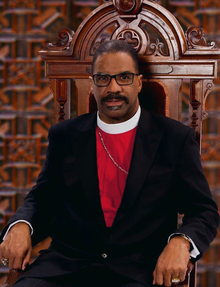Bishop J. Drew Sheard | |
|---|---|
| Presiding Bishop, Church of God in Christ | |
 | |
| Church | Church of God in Christ, Global |
| Diocese | Michigan North Central Jurisdiction |
| Elected |
|
| Predecessor | Charles E. Blake Sr. |
| Previous post(s) |
|
| Orders | |
| Ordination | 1988 (as pastor of Greater Emmanuel Institutional COGIC) |
| Consecration | 2010 (as Bishop of the Michigan North Central Jurisdiction) 2012 (as a member of the COGIC General Board) by
|
| Personal details | |
| Born | John Drew Sheard January 1, 1959 Detroit, Michigan, U.S. |
| Residence | Detroit, Michigan, U.S. |
| Spouse | |
| Children | 2, including Kierra Sheard |
| Alma mater | Wayne State University |
John Drew Sheard Jr. (born January 1, 1959)[1] is an American pastor and minister from Detroit, Michigan, who is the current presiding bishop of the Church of God in Christ, a 6 million-member predominantly African-American Holiness Pentecostal denomination that has now grown to become one of the largest African-American Pentecostal denominations in the United States.[2][3]
Sheard was elected as the leader of the denomination in its first ever all-virtual online election, that was held virtually online due to the COVID-19 pandemic[4] on March 20, 2021. He is the first COGIC presiding bishop from Michigan and is the pastor of the Greater Emmanuel Institutional Church of God in Christ, one of the denomination's largest churches in Michigan.[5] He also previously served as a member of the General Board, the twelve bishops who make up the national COGIC Board of directors, and as the president of the COGIC International Youth Department, the auxiliary ministry department of the denomination focused on youth and young adults, from 1997 to 2001. He was the International President and Chairman of the COGIC Auxiliaries In Ministry convention from 2004 to 2012.[1]
- ^ a b "Our Pastor — GREATER EMMANUEL INSTITUTIONAL CHURCH OF GOD IN CHRIST". Retrieved March 23, 2021.
- ^ Courey, David J. (February 26, 2015). What Has Wittenberg to Do with Azusa?: Luther's Theology of the Cross and Pentecostal Triumphalism. Bloomsbury Publishing. p. 227. ISBN 978-0-567-65631-5.
The controversy led to the emergence of three-step Holiness Pentecostal denominations (the Church of God, Cleveland, TN; the Pentecostal Holiness Church and the Church of God in Christ) and two-step, Finished Work denominations (the Assemblies of God and the Pentecostal Assemblies of Canada).
- ^ Anderson, Allan (May 13, 2004). An Introduction to Pentecostalism: Global Charismatic Christianity. Cambridge University Press. p. 47. ISBN 978-0-521-53280-8.
Those who resisted Durham's teaching and remained in the 'three-stage' camp were Seymour, Crawford and Parham, and Bishops Charles H. Mason, A.J. Tomlinson and J.H. King, respectively leaders of the Church of God in Christ, the Church of God (Cleveland) and the Pentecostal Holiness Church. Tomlinson and King each issued tirades against the 'finished work' doctrine in their periodicals, but by 1914 some 60 percent of all North American Pentecostals had embraced Durham's position. ... The 'Finished Work' controversy was only the first of many subsequent divisions in North American Pentecostalism. Not only did Pentecostal churches split over the question of sanctification as a distinct experience, but a more fundamental and acrimonious split erupted in 1916 over the doctrine of the Trinity. ... The 'New Issue' was a schism in the ranks of the 'Finished Work' Pentecostals that began as a teaching that the correct formula for baptism is 'in the name of Jesus' and developed into a dispute about the Trinity. It confirmed for Holiness Pentecostals that they should have no further fellowship with the 'Finished Work' Pentecostals, who were in 'heresy'.
- ^ "The Church Of God In Christ Elects Bishop J. Drew Sheard As Its New Presiding Bishop". Church Of God In Christ. March 21, 2021. Retrieved March 23, 2021.
- ^ Warikoo, Katherine Burgess and Niraj. "Detroit pastor J. Drew Sheard elected as national head of COGIC denomination, Dearborn pastor elected to board". Detroit Free Press. Retrieved March 23, 2021.